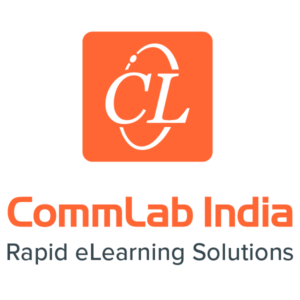How To Use Rapid eLearning To Save SMEs Time?
When it comes to designing effective, accurate, and learner-centric eLearning courses, Subject Matter Experts (SMEs) are invaluable resources. They have vast knowledge and a thorough understanding of the subject. They ensure that the learners receive relevant and insightful information that helps them achieve their learning objectives. However, tight work schedules and the issue of time crunch for SMEs aren’t new. But every lock has a key! In this context, the key is rapid eLearning. Yes, you can use rapid eLearning to save SMEs time. How? Let’s find out!
But first…
A Little Insight Into The SME Time-Crunch Story
Contributing to the eLearning course content isn’t the primary responsibility of SMEs. Surprised? That’s the truth. The primary responsibilities of SMEs include client visits, handling critical business situations, working with different teams, doing research, and more. So, when it comes to eLearning content creation, helping SMEs save time is necessary as much as it is a luxury!
Having more time on their hands enables SMEs to focus on their main role and responsibilities. They can solve critical business issues in a better manner, without being stressed or overwhelmed. Moreover, rapid eLearning minimizes the delay in course reviews and signoffs, thereby facilitating a seamless and streamlined eLearning design and development process.
In this article, I’ll share 5 ways rapid eLearning helps save SMEs time without compromising the quality or effectiveness of the eLearning courses.
Top 5 Ways Rapid eLearning Helps Save SMEs Time
1. Reduces SME Touchpoints
From learning objectives to final signoff, the traditional eLearning course creation process involves multiple interactions between the SME and Instructional Designers. To be precise, there are nine SME touchpoints. Each touchpoint includes a review cycle and iteration process based on SME input. It can be time-consuming and lead to delays in signoffs. To help you understand better, given below is an illustration of the eLearning design and development process depicting the nine SME touchpoints.
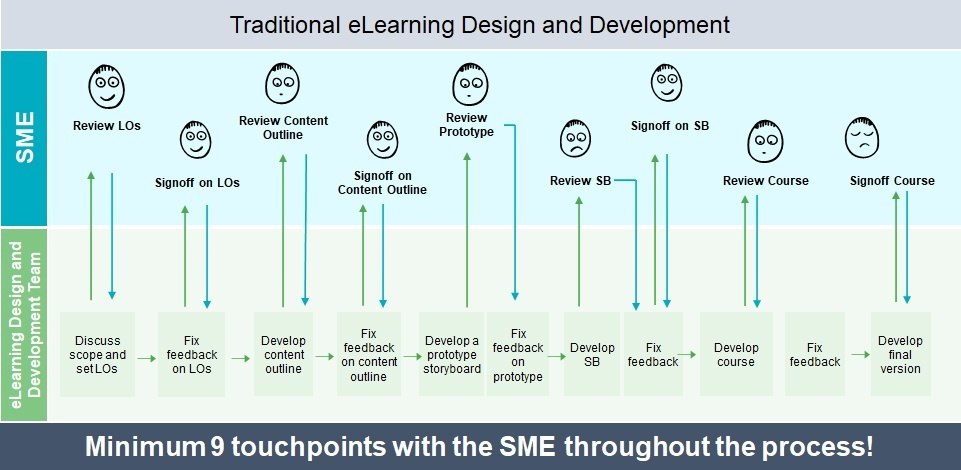
On the other hand, rapid eLearning development significantly reduces the number of SME touchpoints. It brings down the number to three. All the SME needs to do is create (they can even leverage the existing content) a quick PPT with a recording. Yes, just that! And it takes 15 minutes or less.
After this, everything is taken care of by the eLearning design and development team. They create a transcript and streamline the content shared by the SME. Next, Instructional Designers design the PPT slides and share them with the SME for review.
The SME then reviews the PPT slides and shares the feedback. The feedback is incorporated into the eLearning content and the final course is developed with proper voiceover. It is sent for final review and signoff. Here’s a visual representation of the rapid eLearning development with only three SME touchpoints.
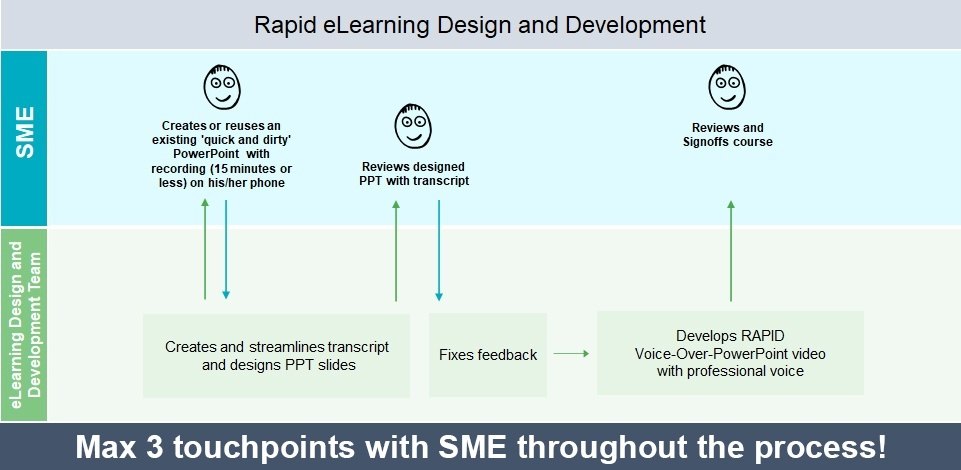
2. Leverages Pre-Existing Content
Often, organizations have a wealth of existing resources such as presentations, handouts, worksheets, documents, etc. Rapid eLearning makes the best use of such pre-existing content to meet modern-day organizational training needs and tackle the time-crunch issue head-on. Here’s how.
SMEs can easily update and furnish the existing content as per the training requirements and market trends instead of having to create everything from scratch. This helps them save a significant amount of time. And for eLearning developers, rapid eLearning authoring tools and the 4 Rs of rapid eLearning are a blessing! They can modify, repurpose, and redesign these pre-existing resources into more effective, learner-centric eLearning modules.
Check out the infographic below to know the 4 Rs of rapid eLearning.
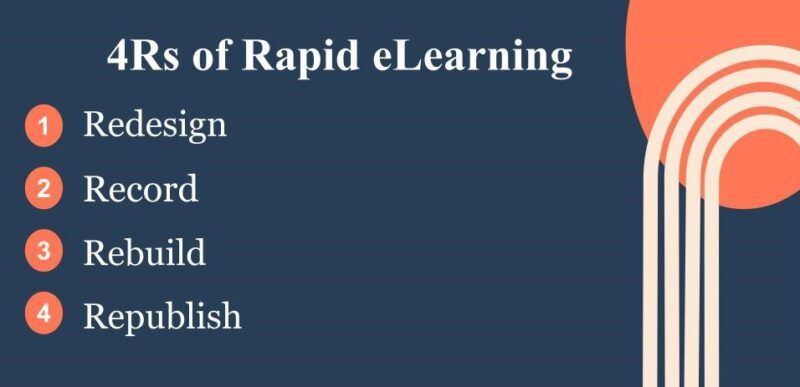
This approach not only accelerates content development but also ensures consistency across various learning materials.
3. Enables Quick And Effective Review
Review processes and collaborations can be time-consuming. Going back and forth between the reviews and feedback takes up a lot of time. But it’s integral and an important aspect of eLearning design and development as well as SME touchpoints. With rapid eLearning, you can handle this issue successfully.
Rapid eLearning authoring tools offer you the benefit of online reviews. SMEs and Instructional Designers can collaborate on the same platform, which ensures seamless integration of the feedback. The SMEs don’t need to share feedback consisting of screenshots; rather, they can share feedback as comments. From there, the eLearning design and development team can collate the feedback and integrate it into the eLearning course. This simplifies the review process, making it more manageable and impactful along with saving the SME time.
Here’s an infographic listing the top 3 rapid eLearning authoring tools for seamless online review and collaboration.
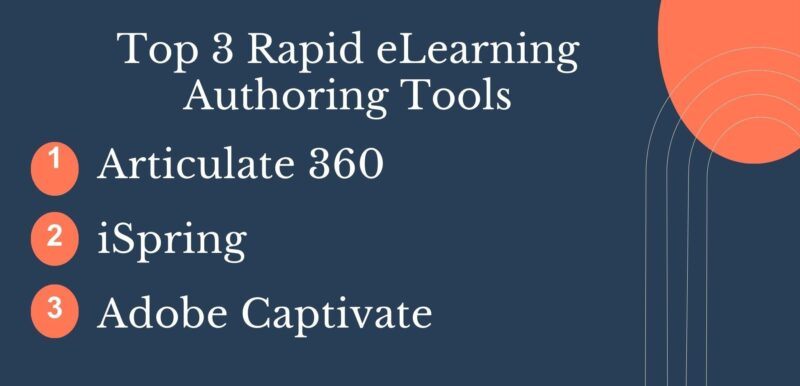
4. Involves SMEs Right From The Start
The role of SMEs in designing and developing high-value, relevant eLearning courses is vital, as they are the storehouse of knowledge and invaluable experiences. So, involve them in the eLearning development process from the very beginning.
Involving SMEs right from the start ensures that the content aligns with their expertise and organizational vision. They even understand the content creation process and can contribute accordingly. From learning objectives and content structuring to storyboarding and the final outcome, review and feedback from SMEs is essential.
Apart from the above reasons, involving SMEs from the beginning also helps you work in a more synergized manner. You can discuss their availability at the very start and schedule the meetings suitably. It helps avoid any confusion or going back and forth in the review process.
All these elements reduce the chances of major revisions later in the process, thereby saving time and effort.
5. Supports Curriculum Building
Developing an eLearning course involves planning, strategizing, organizing, reviewing, and implementing to ensure a structured and coherent learning experience. Now imagine the plight of the SME having to deal with all these steps repeatedly for every single course. It’s time-consuming, and at times monotonous, too! But rapid eLearning saves the day. It helps save SMEs time by supporting curriculum building.
Initially, the SME might have to invest a little more time, but opting for curriculum instead of standalone courses still saves their time along the way. Planning for curriculum brings down the conventional nine SME touchpoints to just five. Here’s a visual depiction of how curriculum building saves SMEs time.
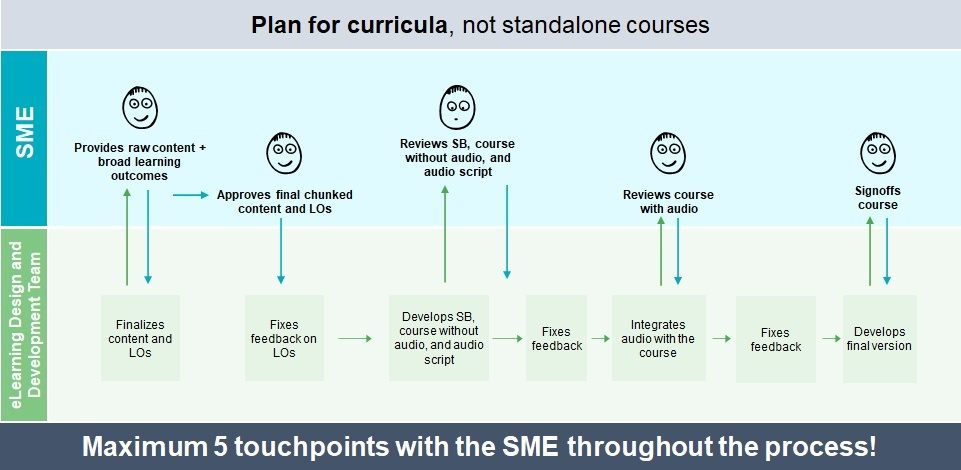
Wrapping Up
SMEs play a pivotal role in shaping eLearning courses, but their time is often stretched thin. To combat this challenge, rapid eLearning takes the forefront. It is a valuable solution that helps save SMEs time and enables them to strike a balance between their core responsibilities and contributing to effective learning experiences in the best way possible.
Stay connected with us on social media platform for instant update click here to join our Twitter, & Facebook
We are now on Telegram. Click here to join our channel (@TechiUpdate) and stay updated with the latest Technology headlines.
For all the latest Education News Click Here
For the latest news and updates, follow us on Google News.

